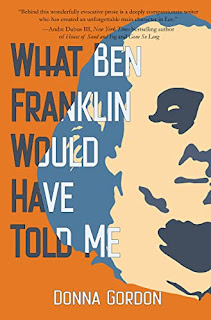Donna Gordon is the author of the new novel What Ben Franklin Would Have Told Me. Her work has appeared in a variety of publications, including Tin House and Ploughshares. She is based in Cambridge, Massachusetts.
Q: What inspired you to write What Ben Franklin Would Have Told Me, and how did you create your characters Lee and Tomás?
A: Two seemingly disparate experiences came together to enable me to create Lee and Tomás. I had been a volunteer at Camp Sunshine—a camp for kids who have life-threatening illnesses and their families—in Sebago, Maine.
I met a boy who had Progeria. I didn’t know anything about that disease, but started to learn about it. My book is set during the Ronald Reagan era. At the time there was very little known about Progeria.
About the same time, I did a project with Amnesty International, for which I interviewed and photographed 15 people who were on their speakers’ list. The people I met were from all over the world, but living in the US. I contacted them one by one and traveled between Maine and Washington, D.C., to ask them to tell me their stories.
Eventually, the project became “Putting Faces on the Unimaginable: Portraits and Interviews with Former Prisoners of Conscience,” and the work was exhibited at Harvard’s Fogg Museum.
Two of the people I met were from Argentina and had been among the Disappeared during the reign of Jorge Videla and the Dirty War. I modeled Tomas after one of the characters I met. But his grief was really influenced by the cumulative experiences of all of the people I met and interviewed.
Q: How would you describe the dynamic between your two characters?
A: At first Lee and Tomás are at real odds with each other. Lee resents that Tomás has been hired by his mother, Cass, to replace his former caretaker, Z. Lee immediately has suspicions about Tomás, particularly about how he got his scars. He begins to research recent events in Buenos Aires.
At first, Tomás is indifferent and on the verge of being repulsed by Lee. But he needs the job and he needs the money. But all he can think about his finding his missing wife and child.
As time goes on, Lee and Tomás verge on a son/father relationship. They gain deep appreciate for one another. Lee is suffering from accelerated time, and Tomás from lost time. They find common ground once they start searching for Tomás’ family in D.C. The way they learn to care for one another becomes very powerful.
Q: The writer Christopher Castellani said of the book, “It reads like a thriller, but is, at its core, a sly and moving exploration of history that brims with heart and intelligence.” What do you think of that description?
A: I think it’s a good description. I didn’t necessarily start out to write a detective story, but the plot structure of a journey helped. And when Lee becomes employed as an unofficial detective, it gives his short life meaning and purpose.
Lee is an autodidact. He’s home schooled and lonely. He takes refuge in, and is fascinated by, the facts of American history. They ground him, when so many other parts of his life don’t make sense. He’s going to die soon, it’s just a matter of when.
I got the idea to have him become fascinated with Ben Franklin because Lee has a quirky sense of humor and is very inventive. I also gave him a Vietnamese potbellied pig named Patrick for a touch of the absurd, and a touch of comic relief.
Tomás is grieving for the lost child he’s never met. He becomes a father figure for Lee, whose own father abandoned him and his mother when Lee was 2, because the facts of Progeria were just too hard.
The journey, or thriller aspect of the book, is a kind of an armature that supports the facts of history along with their growing relationship and reliance upon one another.
Q: Did you know how the novel would end before you started writing it, or did you make any changes along the way?
A: I knew where it would end, but I didn’t know exactly how I’d get there. The journey structure—looking for Tomás’ missing wife and child—gave me a direction. But I detoured from it several times in the exploration. I re-wrote the book from start to finish several times.
The opening chapter originally started in first person, and it was hard to switch it to third, but it worked better for the balance of the narrative. Because of Lee’s disease, there was an inevitable conclusion, but I took advantage of time to explore so many things along the way.
Q: What are you working on now?
A: I’m trying to finish Lesser Saints, a collection of short stories. Six of them have been published, but I want to feel that they’re equally strong. I’m also working on a new novel, sort of testing the waters with it to be sure I can stay with it for the long haul.
Q: Anything else we should know?
A: This is my debut novel!
I’m also a visual artist. You can see my artwork on my website at https://donnasgordon.com/visual-art-1 and on Instagram at donnagordon8994.
--Interview with Deborah Kalb


No comments:
Post a Comment